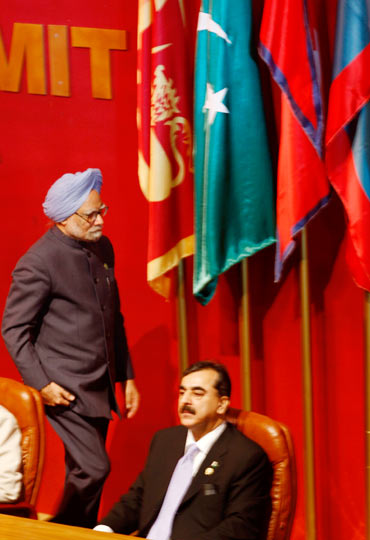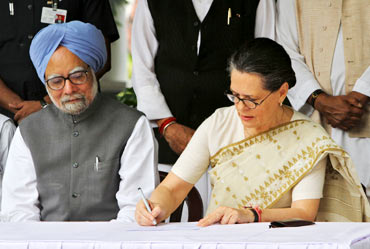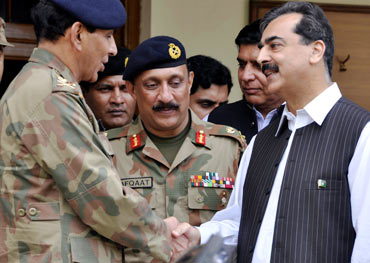Photographs: Buddhika Weerasinghe/Reuters
Pakistan Prime Minister Yousuf Raza Gilani on Friday blamed his Indian counterpart Manmohan Singh for lack of progress in Indo-Pak dialogue, saying that he was unable to stand the pressure inside and outside the Indian Parliament.
"I have had some productive exchanges with my Indian counterpart. I am disappointed that the promise of those meetings has not yet been realised. Full resumption of the dialogue process has yet to happen," Gilani said in an interaction with members of the Diplomatic Correspondents Association of Pakistan.
"The only way forward for India and Pakistan is dialogue," Gilani said.
Agencies
..
'Singh couldn't stand the Parliament pressure'
Image: Congress president Sonia Gandhi watched by PM Singh while filing her nominationsPhotographs: Asim Tanveer/Reuters
Lasting peace and security in South Asia 'can only be achieved with a sincere effort to resolve long-standing disputes' and this requires leadership, vision and courage, he added.
Asked what had gone wrong in several recent meetings and talks between India and Pakistan, Gilani said he believed no breakthrough could be made because of domestic pressures faced by Singh.
"I think the Prime Minister (Singh) could not stand the pressure within Parliament and India," he said.
'Pak does not want to fight with India'
Image: Gilani shakes hands with Pakistani Army Chief Ashfaq Parvez Kayani at army headquarters in MultanPhotographs: Reuters
Replying to a question on a proposal made by President Asif Ali Zardari that Pakistan would not resort to a "first use" option for its nuclear arsenal, Gilani said the country had made it clear to the world community that it does "not want to fight with India" or its other neighbours.
"We are a nuclear power and yet we are saying we do not want to fight with our neighbours. The objective is that we want peace and better relations," he said, adding that his government will never compromise on national interests while resolving outstanding issues.
Singh backtracked on Sharm-el-Sheikh statement, hints Pak
Image: Pakistani Rangers and BSF jawans lower their respective country flags during the daily parade at Wagah borderPhotographs: Mohsin Raza/Reuters
"The capability of the Indian military is Pakistan-centric and that of the Pakistani military is India-centric... We want to have dialogue and cordial relations with India. We don't want to fight because both have the (nuclear) capability," he said.
Dispelling the impression that his government had failed to address outstanding issues with India, Gilani said he had had several meetings with Singh and a joint statement issued after their meeting at Sharm-el-Sheikh in Egypt last year had for the first time included a reference to the situation in Balochistan.
Singh had agreed to his suggestion that bilateral relations should not be held hostage to the 2008 Mumbai terror attacks, he said. Singh was also ready to discuss all "core issues, including Kashmir," he said.





article